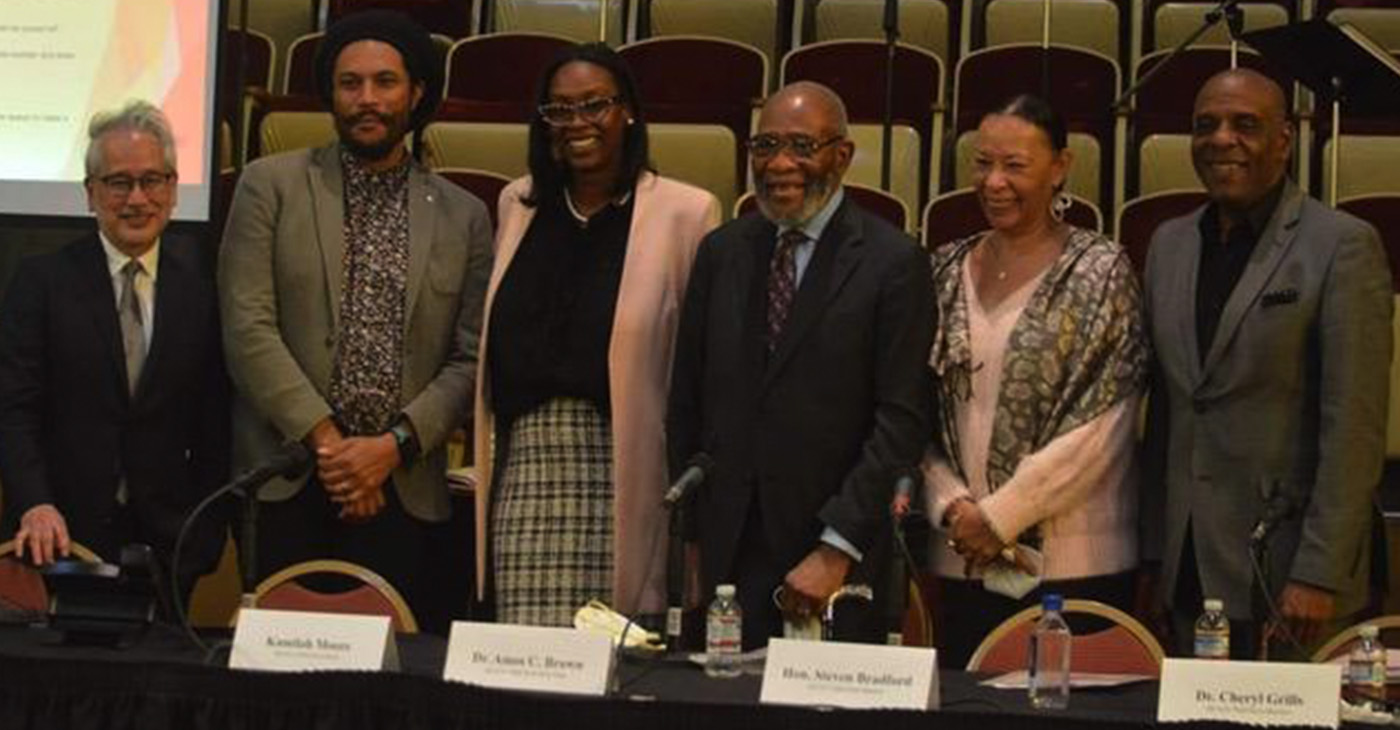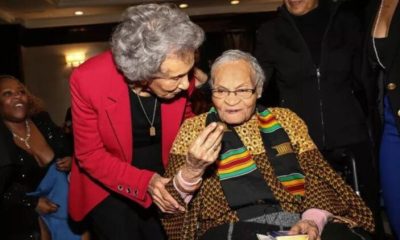Activism
Reparations Task Force: What to Expect in the Committee’s First Report
California’s AB 3121, signed into law in 2020, created the nine-member task force to investigate the history and costs of slavery in California and around the United States. AB 3121 charges the Reparations Task Force with studying the institution of slavery and its lingering negative effects on Black Californians who are descendants of persons enslaved in the United States.

By Antonio Ray Harvey, California Black Media
The California Task Force to Study and Develop Reparations Proposals for African Americans will submit its first report to the California Legislature in June.
The 13-chapter document will detail the committee’s findings so far and include recommendations related to them.
Task force member Donald K. Tamaki said the “comprehensive report connects the dots between past racism and its current consequences.” He also inferred that the report presents a “landmark opportunity” to shape the national conversation around reparations.
“I think the report will not only attract California publicity but will also be looked upon nationally,” Tamaki said before the task force approved the report. “With the report, we can go out to the people to develop an allyship and (generate) support for it.”
As prescribed in Assembly Bill (AB) 3121, the report will establish how California laws and policies have disproportionately and negatively affected African Americans. The report will be available to the public.
The California Department of Justice’s (DOJ) Civil Rights Enforcement Section formulated the document based on hearings, expert testimonies, and evidence accumulated since the panel first convened on June 1, 2021.
One of the DOJ’s duties is to facilitate task force consultation with various experts on California history and reparations. The department also provides administrative, technical, and legal assistance to the panel.
The preliminary report opens with an introduction that leads to chapters focused on enslavement, racial terror and political disenfranchisement, among others. It also covers a range of topics documenting historical injustices Black Americans have endured, including housing segregation, separate and unequal education, environmental racism, and others.
Titles such as “Pathologizing the Black Family;” “Control over Spiritual, Creative and Cultural life;” “Stolen Labor and Hindered Opportunity;” and “An Unjust Legal System,” among others, frame the testimonies and historical accounts recorded during the task force meetings.
Task Force Chair Kamilah Moore wrote the foreword. Her introduction is an overview of the task force’s activities over the last year.
“This interim report will catalog all those harms we’ve discussed throughout those two-day virtual meetings since June of last year,” Moore said in an online Blk TLK Platform discussion in April. “It will also have some preliminary recommendations for the legislation to adopt.”
The first report was supervised by Michael Newman, the California Department of Justice’s (DOJ) Senior Assistant Attorney General of the Civil Rights Enforcement Section (DOJCRE).
The task force voted to describe the first presentation, the “Interim Report.”
Tamaki said about 10 DOJCRE attorneys — including Deputy Attorney General Xiyun Yang, DOJCRE Legal Assistant Francisco Balderrama and additional DOJ staff members created the report.
In a collaborative effort, the diverse DOJCRE team, Newman added, consulted with the task force to determine edits, make clarifications in terminology, modify corrections, and implement recommendations.
“It was a labor of love for everyone who worked on it,” Newman said during the task force meeting held in San Francisco on April 14. “I also want to thank all of the (task force) members and the community’s input in producing an incredible record.”
California’s AB 3121, signed into law in 2020, created the nine-member task force to investigate the history and costs of slavery in California and around the United States. AB 3121 charges the Reparations Task Force with studying the institution of slavery and its lingering negative effects on Black Californians who are descendants of persons enslaved in the United States.
The group is tasked with studying and developing reparation proposals for African Americans and recommending appropriate ways to educate Californians about the task force’s findings.
After the task force decided on March 30 that lineage will determine who will be eligible for compensation, the panel approved a framework for calculating how much should be paid — and for which offenses — to individuals who are Black descendants of enslaved people in the United States.
An expert team of economists identified 13 categories that would be the basis of the method used to calculate damages and determine what constitutes harms and atrocities. A second report is due by July 2023 when the task force two-year charge is expected to end.
Members of the task force include Moore, a Los Angeles-based attorney, reparations scholar and activist; vice-chair Dr. Amos Brown, a civil rights leader and respected Bay Area pastor whose journey to leadership started under the tutelage of Dr. Martin Luther King Jr. in the 1960s; Cheryl Grills, a professor at Loyola Marymount University in Los Angeles; and Lisa Holder, a nationally recognized trial attorney.
Rounding out the panel are Sen. Steven Bradford (D-Gardena); Assemblymember Reginald Jones-Sawyer (D-Los Angeles); San Diego Councilmember Monica Montgomery Steppe; Dr. Jovan Scott Lewis, chair of the Department of Geography at the University of California Berkeley; and Donald Tamaki, Esq. is an attorney best known for his role in the reopening of the Supreme Court case Korematsu v. the United States, which led to the conviction being overturned of Fred Korematsu who refused to be taken into custody during the imprisonment of Japanese Americans in World War II.
For more information, visit https://oag.ca.gov/ab3121#
Activism
Oakland Post: Week of December 24 – 30, 2025
The printed Weekly Edition of the Oakland Post: Week of – December 24 – 30, 2025

To enlarge your view of this issue, use the slider, magnifying glass icon or full page icon in the lower right corner of the browser window.
Activism
Lu Lu’s House is Not Just Toying Around with the Community
Wilson and Lambert will be partnering with Mayor Barbara Lee on a toy giveaway on Dec. 20. Young people, like Dremont Wilkes, age 15, will help give away toys and encourage young people to stay in school and out of trouble. Wilkes wants to go to college and become a specialist in financial aid. Sports agent Aaron Goodwin has committed to giving all eight young people from Lu Lu’s House a fully paid free ride to college, provided they keep a 3.0 grade point average and continue the program. Lu Lu’s House is not toying around.

Special to the Post
Lu Lu’s House is a 501c3 organization based in Oakland, founded by Mr. Zirl Wilson and Mr. Tracy Lambert, both previously incarcerated. After their release from jail, they wanted to change things for the better in the community — and wow, have they done that!
The duo developed housing for previously incarcerated people, calling it “Lu Lu’s House,” after Wilson’s wonderful wife. At a time when many young people were robbing, looting, and involved in shootings, Wilson and Lambert took it upon themselves to risk their lives to engage young gang members and teach them about nonviolence, safety, cleanliness, business, education, and the importance of health and longevity.
Lambert sold hats and T-shirts at the Eastmont Mall and was visited by his friend Wilson. At the mall, they witnessed gangs of young people running into the stores, stealing whatever they could get their hands on and then rushing out. Wilson tried to stop them after numerous robberies and finally called the police, who Wilson said, “did not respond.” Having been incarcerated previously, they realized that if the young people were allowed to continue to rob the stores, they could receive multiple criminal counts, which would take their case from misdemeanors to felonies, resulting in incarceration.

Lu Lu’s House traveled to Los Angeles and obtained more than 500 toys
for a Dec. 20 giveaway in partnership with Oakland Mayor Barbara
Lee. Courtesy Oakland Private Industry,
Wilson took it upon himself to follow the young people home and when he arrived at their subsidized homes, he realized the importance of trying to save the young people from violence, drug addiction, lack of self-worth, and incarceration — as well as their families from losing subsidized housing. Lambert and Wilson explained to the young men and women, ages 13-17, that there were positive options which might allow them to make money legally and stay out of jail. Wilson and Lambert decided to teach them how to wash cars and they opened a car wash in East Oakland. Oakland’s Initiative, “Keep the town clean,” involved the young people from Lu Lu’s House participating in more than eight cleanup sessions throughout Oakland. To assist with their infrastructure, Lu Lu’s House has partnered with Oakland’s Private Industry Council.
For the Christmas season, Lu Lu’s House and reformed young people (who were previously robbed) will continue to give back.
Lu Lu’s House traveled to Los Angeles and obtained more than 500 toys.
Wilson and Lambert will be partnering with Mayor Barbara Lee on a toy giveaway on Dec. 20. Young people, like Dremont Wilkes, age 15, will help give away toys and encourage young people to stay in school and out of trouble. Wilkes wants to go to college and become a specialist in financial aid. Sports agent Aaron Goodwin has committed to giving all eight young people from Lu Lu’s House a fully paid free ride to college, provided they keep a 3.0 grade point average and continue the program. Lu Lu’s House is not toying around.
Activism
Desmond Gumbs — Visionary Founder, Mentor, and Builder of Opportunity
Gumbs’ coaching and leadership journey spans from Bishop O’Dowd High School, Oakland High School, Stellar Prep High School. Over the decades, hundreds of his students have gone on to college, earning academic and athletic scholarships and developing life skills that extend well beyond sports.

Special to the Post
For more than 25 years, Desmond Gumbs has been a cornerstone of Bay Area education and athletics — not simply as a coach, but as a mentor, founder, and architect of opportunity. While recent media narratives have focused narrowly on challenges, they fail to capture the far more important truth: Gumbs’ life’s work has been dedicated to building pathways to college, character, and long-term success for hundreds of young people.
A Career Defined by Impact
Gumbs’ coaching and leadership journey spans from Bishop O’Dowd High School, Oakland High School, Stellar Prep High School. Over the decades, hundreds of his students have gone on to college, earning academic and athletic scholarships and developing life skills that extend well beyond sports.
One of his most enduring contributions is his role as founder of Stellar Prep High School, a non-traditional, mission-driven institution created to serve students who needed additional structure, belief, and opportunity. Through Stellar Prep numerous students have advanced to college — many with scholarships — demonstrating Gumbs’ deep commitment to education as the foundation for athletic and personal success.

NCAA football history was made this year when Head Coach from
Mississippi Valley State, Terrell Buckley and Head Coach Desmond
Gumbs both had starting kickers that were women. This picture was
taken after the game.
A Personal Testament to the Mission: Addison Gumbs
Perhaps no example better reflects Desmond Gumbs’ philosophy than the journey of his son, Addison Gumbs. Addison became an Army All-American, one of the highest honors in high school football — and notably, the last Army All-Americans produced by the Bay Area, alongside Najee Harris.
Both young men went on to compete at the highest levels of college football — Addison Gumbs at the University of Oklahoma, and Najee Harris at the University of Alabama — representing the Bay Area on a national level.
Building Lincoln University Athletics From the Ground Up
In 2021, Gumbs accepted one of the most difficult challenges in college athletics: launching an entire athletics department at Lincoln University in Oakland from scratch. With no established infrastructure, limited facilities, and eventually the loss of key financial aid resources, he nonetheless built opportunities where none existed.
Under his leadership, Lincoln University introduced:
- Football
- Men’s and Women’s Basketball
- Men’s and Women’s Soccer
Operating as an independent program with no capital and no conference safety net, Gumbs was forced to innovate — finding ways to sustain teams, schedule competition, and keep student-athletes enrolled and progressing toward degrees. The work was never about comfort; it was about access.
Voices That Reflect His Impact
Desmond Gumbs’ philosophy has been consistently reflected in his own published words:
- “if you have an idea, you’re 75% there the remaining 25% is actually doing it.”
- “This generation doesn’t respect the title — they respect the person.”
- “Greatness is a habit, not a moment.”
Former players and community members have echoed similar sentiments in public commentary, crediting Gumbs with teaching them leadership, accountability, confidence, and belief in themselves — lessons that outlast any single season.
Context Matters More Than Headlines
Recent articles critical of Lincoln University athletics focus on logistical and financial hardships while ignoring the reality of building a new program with limited resources in one of the most expensive regions in the country. Such narratives are ultimately harmful and incomplete, failing to recognize the courage it takes to create opportunity instead of walking away when conditions are difficult.
The real story is not about early struggles — it is about vision, resilience, and service.
A Legacy That Endures
From founding Stellar PREP High School, to sending hundreds of students to college, to producing elite athletes like Addison Gumbs, to launching Lincoln University athletics, Desmond Gumbs’ legacy is one of belief in young people and relentless commitment to opportunity.
His work cannot be reduced to headlines or records. It lives on in degrees earned, scholarships secured, leaders developed, and futures changed — across the Bay Area and beyond.
-

 #NNPA BlackPress4 weeks ago
#NNPA BlackPress4 weeks agoLIHEAP Funds Released After Weeks of Delay as States and the District Rush to Protect Households from the Cold
-

 Alameda County3 weeks ago
Alameda County3 weeks agoSeth Curry Makes Impressive Debut with the Golden State Warriors
-

 Activism4 weeks ago
Activism4 weeks agoOakland Post: Week of November 26 – December 2, 2025
-

 #NNPA BlackPress4 weeks ago
#NNPA BlackPress4 weeks agoSeven Steps to Help Your Child Build Meaningful Connections
-

 #NNPA BlackPress4 weeks ago
#NNPA BlackPress4 weeks agoSeven Steps to Help Your Child Build Meaningful Connections
-

 #NNPA BlackPress4 weeks ago
#NNPA BlackPress4 weeks agoTrinidad and Tobago – Prime Minister Confirms U.S. Marines Working on Tobago Radar System
-

 #NNPA BlackPress4 weeks ago
#NNPA BlackPress4 weeks agoThanksgiving Celebrated Across the Tri-State
-

 #NNPA BlackPress4 weeks ago
#NNPA BlackPress4 weeks agoTeens Reject Today’s News as Trump Intensifies His Assault on the Press





















































